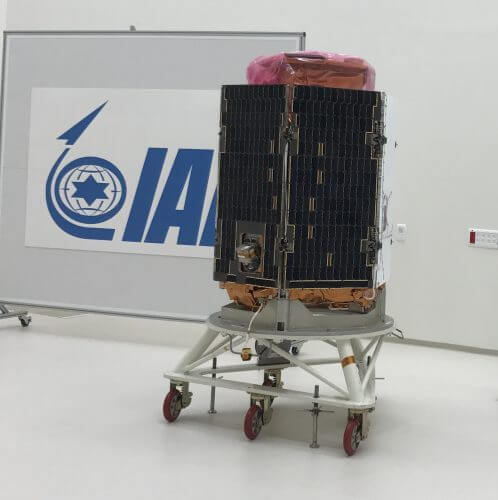During the ceremony, the head of CNES also announced that he had signed agreements with the director general of the Israel Space Agency, Avi Blasberger, to develop fast and cheap missions for climate research

"The space missions that perform observations on the Earth are of great importance in the fight against global warming." This is what the head of the French Space Agency, Jean-Yves Legal, said yesterday at a ceremony held at the Aerospace Industry facilities on the occasion of the transfer of the satellite, whose development lasted for about 12 years, to the French Space Agency in preparation for its launch on August 1, 2017.
The satellite was built and assembled by the Aerospace Industry. The multispectral camera on it was developed and built at Alup, and the ion engine (electric drive) was developed at Rafael.
"This is an important day for the space community in general. We have been cooperating with Israel since 1986. I worked at the Ministry of Economy then. We implemented cooperation with the aerospace industry and with the space industry in Israel in general, which ultimately resulted in the Venus project that began in 2005. As you know, Venus is an ambitious observation mission on Earth for changes in vegetation. This way we can identify changes in the vegetation pattern that are created as a result of climate change. The Venus satellite is in the final stages of its preparation for launch on August 1. It will be the first Israeli satellite launched from French Guiana in twenty years (Amos 1, launched in May 1996 AB). The satellite will photograph selected areas in high resolution and wide angle. For the first time, and Israel can claim the technological breakthrough, many areas, including in Israel, will be photographed once every two days by satellite. Although the resolution of Venus is five meters (albeit in 12 wavelengths), but in relation to its size it is a huge technological achievement.
The satellite will collect a lot of scientific data that will be used not only by the scientists participating in the project, but by the entire scientific community."
Earth observation satellite missions are an important element in the implementation of the Paris climate agreement in which a general agreement was reached on the need to fight climate change. At COP22 - the follow-up conference held last year in Marrakesh last November, confirmed the role of space in the study of climate change. The Venus mission will make it possible to study the response of vegetation to human activities and global warming, which is also of course a product of human activity. Climate change has an impact on humanity. We need these space operators to know how to prepare in the short term and what to do to stop the process in the long term. The Copernicus mission of the European Space Agency, in which France is also involved, has already made a considerable contribution to this knowledge. More than half of the fifty or so parameters that scientists measure to examine climate change are only measured from space. The data from space helps to build and constantly improve the climate models. The space missions are essential both to understand what is happening and to shape policy. Thus the space community has a great responsibility, a greater responsibility than ever before. Where is Venus, is a challenging mission that will help understand climate change for the benefit of all humanity. I hope the next generation of space missions will help convince the skeptics that action is needed.
"Israel has developed advanced technologies thanks to the engineers at the highest level. Without them such a miracle could not have been developed. I want to praise the cooperation between CNES and the Israeli Space Agency and between the industries in Israel and France."
My Israeli colleague Avi Blasberger and I decided to open a new project of quick and cheap missions in the field of climate monitoring that started immediately after the launch of the Venus satellite.
"Satellites have a central role today in researching and preserving the environment and climate. I am excited to see our first-rate engineers partner in the development of Venus, a mission that will help the international community deal with climate change. We will continue the cooperation in other areas as well."
In conclusion, the head of the French Space Agency says: "I see a bonus as a symbol of our determination to fight together in what will be the most fateful battle for humanity in the decades to come. The truth is that when the French and Israelis work together there is nothing they cannot achieve. This achievement shows the opportunities for cooperation between the countries in the field of space."
Deputy Ambassador of France to Israel Gilles Paxo: "Today we celebrate an important achievement. Venus, an Israeli-French satellite is being transferred to Coro in French Guiana for its launch in two months. This is an achievement that our countries should be proud of. Proud of the 23 years of cooperation so far between the Israeli Space Agency and CNES Proud of the fact that both countries have been able to establish successful space programs. Although this is not the first satellite in which we cooperate in launching - as you remember we launched the Amos 1 satellite from its origin, it is a special project. The Venus mission will enable monitoring of climate-related phenomena and the impact of global warming, gather scientific knowledge and validate new technologies. The scientific data is important, but especially it will help increase awareness of the effects of global warming. Let's hope our Israeli friend will do the same."
"Currently over 140 countries, representing 80% of carbon emissions, have ratified the climate agreement in Paris signed in December 2015 (COP21). Following the convention, Israel announced ambitious goals and now must take steps to implement them."
